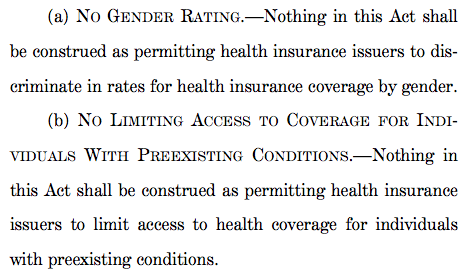
One of the key sticking points over U.S. House Republicans’ plan to repeal and replace Obamacare is what will happen to people with pre-existing health conditions if this new plan passes.
North Carolina Republican Rep. Robert Pittenger supports the bill. He said Tuesday that people still would be able to buy health insurance even if they already have cancer, heart disease, diabetes or some other type of health issue.
One of the biggest changes in the Affordable Care Act, or Obamacare, was a requirement that insurers cannot reject people on the basis of pre-existing conditions or charge them exorbitant rates for their premiums.
"The American Health Care Act absolutely does not eliminate protections for pre-existing conditions," Pittenger said.
However, that is misleading.
It’s an issue that affects many people, too. According to the nonpartisan Kaiser Family Foundation, more than one in four Americans between 18 and 64 has a pre-existing condition – including more than 1.6 million people in Pittenger’s state of North Carolina.
Of those, 86,000 North Carolinians with pre-existing conditions buy their insurance through the Obamacare marketplace, according to Avalere, a Washington, D.C, health care consulting company – as do nearly 2.3 million people nationwide.
President Donald Trump made a similar claim to Pittenger’s, saying on April 30 that "pre-existing conditions are in the bill."
PolitiFact rated that Mostly False.
Pittenger made his claim two days later. However, nothing changed in that time regarding the AHCA’s proposed rules for protecting people with pre-existing conditions.
So Pittenger’s claim misses the mark, too.
Weakening current protections
The AHCA does keep the requirement that people with pre-existing conditions must be offered health insurance. But it would drop Obamacare’s rules capping how much extra those people can be charged.
The part of the AHCA dealing with pre-existing conditions is the MacArthur Amendment, named after Republican Rep. Tom MacArthur of New Jersey. (See PolitiFact’s full analysis of the amendment here.)
Compare two of the amendment’s key provisions:

So it appears people wouldn’t pay wildly different rates due only to their gender, which is also the case under Obamacare. But by contrast, insurers would only have to provide access to coverage for people with pre-existing conditions. It says nothing about the rates of that coverage.
That means if the AHCA passes, it would allow for people with pre-existing conditions to be charged more per year for their insurance coverage – possibly to the tune of thousands or even tens of thousands of dollars more per year, some studies have found.
The exact amount might differ regionally, since some states might not allow the higher rates.